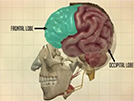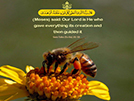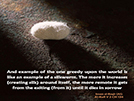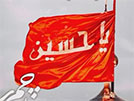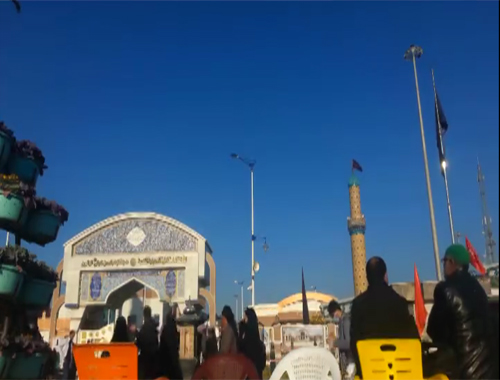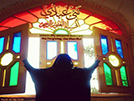Imamate
- Details
- Hits: 3896
IMAMATE
Question:
What is the imamate?
Answer:
The meaning of the imamate is that the greatest of all the prophets, Muhammad (God’s blessings and peace be upon him and his progeny) appointed by the command of God Almighty successors to take his place after his demise in guiding the people and showing them the true path. Their number is twelve, in succession.
Question:
Who are the 12 Imams?
Answer:
1. Imam ‘Ali, Amir al-Mu’minin
2. Imam al-Hasan
3. Imam al-Husayn
4. Imam Zayn al-‘Abidin
5. Imam Muhammad al-Baqir
6. Imam Ja‘far al-Sadiq
7. Imam Musa al-Kadhim
8. Imam ‘Ali al-Rida
9. Imam Muhammad al-Jawad
10. Imam ‘Ali al-Hadi
11. Imam Hasan al-‘Askari
12. Imam al-Hujja al-Mahdi
Question:
What are their characteristics?
Answer:
These Imams, as is of course the case with the Prophet Muhammad and his daughter Fatima al-Zahra’, are all protected by God from every sin and transgression and they stand at the highest level of virtue and holiness. The difference between the Prophet Muhammad and the Imams is that the Prophet was the recipient of revelation direct from God himself whereas this was not the case with the Imams.
Question:
What distinguishes the Imams from great discoverers and inventors?
Answer:
Apart from the fact that the Imams are God’s deputies (khulafa’ Allah) on earth and are at the highest peak of humanity, they also laid out the bases for a happy life and followed the correct way which would make such a life a reality. They showed clearly the path to a true humanity so that were people only to follow it, they would experience happiness in this world before they did so in the next. Is it not reasonable that whoever indicates the way to attain such a life should have a higher status than someone who introduces to mankind lighting or a new means of travelling about?
Question:
Explain the distinction and difference.
Answer:
A life of well-being and happiness, before anything else, depends on peace and security, freedom from want, knowledge, health and virtue. In contrast, war, poverty and ignorance, disease, crime and depravity in all its forms, result necessarily in distress. Secondly it depends upon factors that make life more comfortable like aeroplanes for travelling, electricity for lighting and elevators for getting up into high buildings. These ways to make life easier are to be contrasted with the use of animals for travelling and candles for lighting, and so on.
It is clear that these means alone cannot be the means of welfare and prosperity for man unless life is so structured that it will bring about happiness and well-being. What is better, having peace, even if man lights a candle to see, or having electricity, when man at the same time is plagued by wars and anarchy?
The Prophets and Imams made clear to the people the way to a life of well-being which is the most important thing. Thus it is a mistake to compare the virtues of anyone else to their virtues even though he be an inventor or a scientist.
Question:
Is it correct that Muslims believe that the twelfth imam, Imam al-Mahdi is still alive? If so, what is the use?
Answer:
Yes. The truthful Prophet and the Imams have testified that he remains alive, to appear at the end of time and fill the world with justice after it had been full of oppression. He will establish peace everywhere as well as bringing prosperity, knowledge, health and virtuous living which will turn this world into a small paradise.
Question:
Is it possible for anyone to have such a long life?
Answer:
It is indeed possible, for history has related that some people have lived for centuries. Also modern knowledge has proved the possibility of survival. So much so that in the west at the present time research is being specifically carried out to this end. And more than all this, is the truth that God Almighty is omnipotent and all-powerful.
Question:
What is the meaning of qada’ and qadar?
Answer:
Just as an engineer draws out plans for a building, provides the necessary equipment and materials, and gives the workers the necessary instructions for carrying out the work, similarly God too has drawn out a wise plan for this world called qadar.
Thereafter, he has also provided the equipment and materials by means of which work may be carried out, that is qada’. After that, He ordered people to do good and forbad them from doing evil and now whoever does a good thing will be rewarded for it, and whoever does something bad will be punished.
Thus God in the Holy Qur’an says: “If you do good, you do good [only] for yourselves, but if you transgress [you transgress] against yourselves”[17: 7].
Question:
What is the meaning of jabr and ikhtiyar: compulsion and free will? Is man forced in his actions or does he possess free will?
Answer:
Jabr is the opposite of ikhtiyar. For example, a healthy person can choose to move his hand about at will but the movement of the hand of a person afflicted with a trembling ailment is involuntary.
Man has freedom of choice in his actions: he can do good or do bad as he wishes. However, man has no freedom of choice in matters like being male or female, white or black, handsome or ugly and so on.
Question:
Is God Almighty involved at all in the actions of mankind?
Answer:
Yes, and the meaning of that is: means and materials are from God and the action is from man. For instance, if someone builds a house, the labourers, the aptitude of the contractor, the land on which the house is to be built and the building materials are the result of God's creation whereas the actual process of constructing the house is the work of man. So it is with man's actions. If he does something good, prayer for example, he deserves a reward for that but if he does something bad, like adultery, he deserves to be punished.



